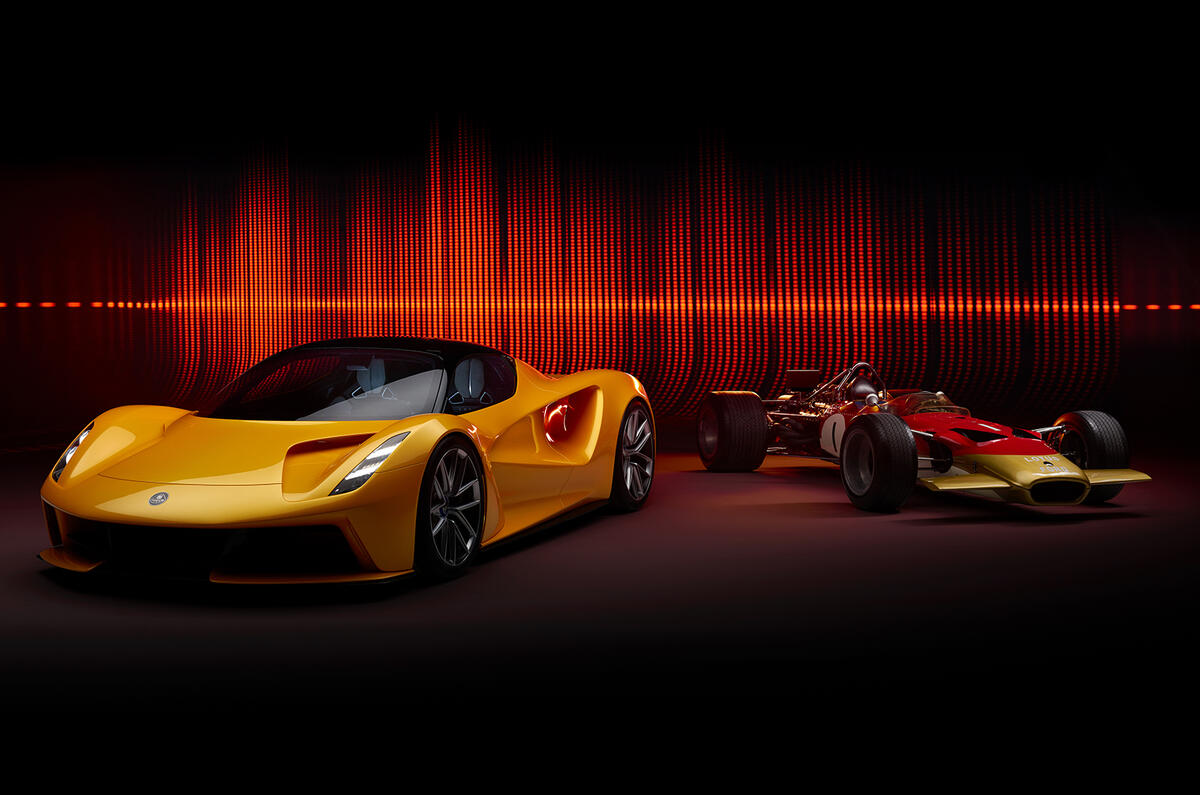The forthcoming Lotus Evija electric hypercar will feature an electric motor sound that is based on the engine note of the Ford Cosworth DFV-powered Lotus 49 Formula 1 car.
The limited-run 2000bhp machine will be the first electric car produced by the Norfolk firm and is due to be launched later this year. Safety regulations require EVs to produce a noise at lower speeds to alert pedestrians to their presence and some firms are also choosing to add artificial noises at higher speeds to ‘enhance’ the visceral experience.
Lotus has recruited music producer Patrick Patrikios, who has worked with artists such as Britney Spears and Olly Murs as well as on a number of film soundtracks, to help develop a range of sounds from the Evija.
Patrikios said the brief was to create “a soundscape for the Evija that was recognisably and distinctively Lotus”, which led the firm to use the V8 engine note of the Lotus 49’s DFV engine as a starting point. “There’s a purity to that V8, a raw edge and an emotion that stirs something in your soul,” said Patrikios.
However, the noise generated by the Evija will sound very different from that V8. Patrikios took a digital recording of the engine note, which was then slowed down and adjusted to a frequency close to the natural noise of the Evija’s electric drivetrain.
“I adjusted the replay speeds and digital filtering of the Type 49 to generate a soundscape for the Evija. It was a very organic process,” said Patrikios. “We all wanted something to spark an emotional connection between car and driver. Sound is hugely influential when it comes to creating and forming emotions, to enrich that bond that’s such a critical part of the Lotus experience.”
The noise produced by Patrikios will be used for the Evija’s external noise and has also been used as the basis for the various tones produced by functions in the car, such as the indicator noise.
Lotus has yet to provide a sample of the exact noise the Evija will produce. Following a delay due to the pandemic, first deliveries of the hypercar are expected to take place in the middle of this year.
Lotus isn't the first firm to look outside the car industry for help to develop the noise of future EVs. BMW, for example, has been working with Hollywood soundtrack composer Hans Zimmer.
The Lotus 49 is one of the Hethel firm’s most successful grand prix cars and was the first to use the Cosworth DFV engine, which went on to become the most successful in F1 history.
Jim Clark took victory in a Lotus 49 in the 1967 Dutch Grand Prix on the car’s debut and Graham Hill used one of the machines to win the 1968 F1 title.
READ MORE
Analysis: how EVs are sparking a noise revolution
Lotus Evija deliveries delayed until mid-2021
Lotus confirms new sports car, end of Elise, Exige and Evora








Join the debate
Add your comment
Transplanting past "glorious" noise into an electric car is distorted nostalgia. Silence is golden, golden... keep singing or hearing your sound system in your muted motor car, even though it is a hypercar.
“We all wanted something to spark an emotional connection between car and driver. Sound is hugely influential when it comes to creating and forming emotions, to enrich that bond that’s such a critical part of the Lotus experience,” he said.
Fake is fake. If it's fake, there is no emotional connection. I'd rather just hear whatever sound the electric driveline actually makes. This is why an electric car, no matter how fast or competent, will never generate the emotional appeal of an ICE car.